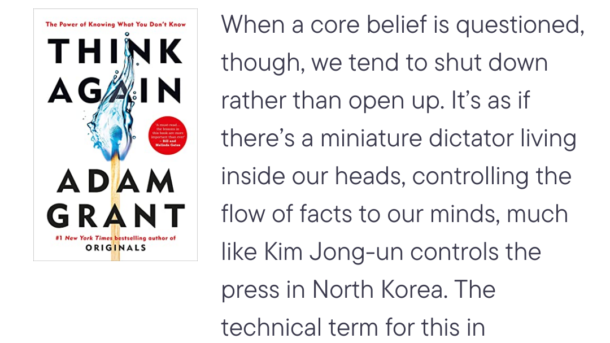In a classic paper, sociologist Murray Davis argued that when ideas survive, it’s not because they’re true—it’s because they’re interesting. What makes an idea interesting is that it challenges our weakly held opinions. Did you know that the moon might originally have formed inside a vaporous Earth out of magma rain? That a narwhal’s tusk is actually a tooth? When an idea or assumption doesn’t matter deeply to us, we’re often excited to question it. The natural sequence of emotions is surprise (“Really?”) followed by curiosity (“Tell me more!”) and thrill (“Whoa!”). To paraphrase a line attributed to Isaac Asimov, great discoveries often begin not with “Eureka!” but with “That’s funny . . .” When a core belief is questioned, though, we tend to shut down rather than open up. It’s as if there’s a miniature dictator living inside our heads, controlling the flow of facts to our minds, much like Kim Jong-un controls the press in North Korea. The technical term for this in psychology is the totalitarian ego, and its job is to keep out threatening information. It’s easy to see how an inner dictator comes in handy when someone attacks our character or intelligence. Those kinds of personal affronts threaten to shatter aspects of our identities that are important to us and might be difficult to change. The totalitarian ego steps in like a bodyguard for our minds, protecting our self-image by feeding us comforting lies. They’re all just jealous. You’re really, really, ridiculously good-looking. You’re on the verge of inventing the next Pet Rock. As physicist Richard Feynman quipped, “You must not fool yourself—and you are the easiest person to fool.”
I find that the hardest people to communicate differing ideas to are those who tether their beliefs really closely to their identity. At the risk of sounding a little too “self-helpish”, it really helps to never get too attached to any of your beliefs or thoughts and tie them too closely to your identity. I’ve met many who might have formed certain beliefs as part of their personal journey and “narrative” and it always becomes difficult to convince such people of other contradicting beliefs or path.
To quote another part of the book that’s too short to be covered, we got to unlock the “joy of being wrong”, and the only way we can do so is “detaching your present from your past and detaching your opinions from your identity. “



